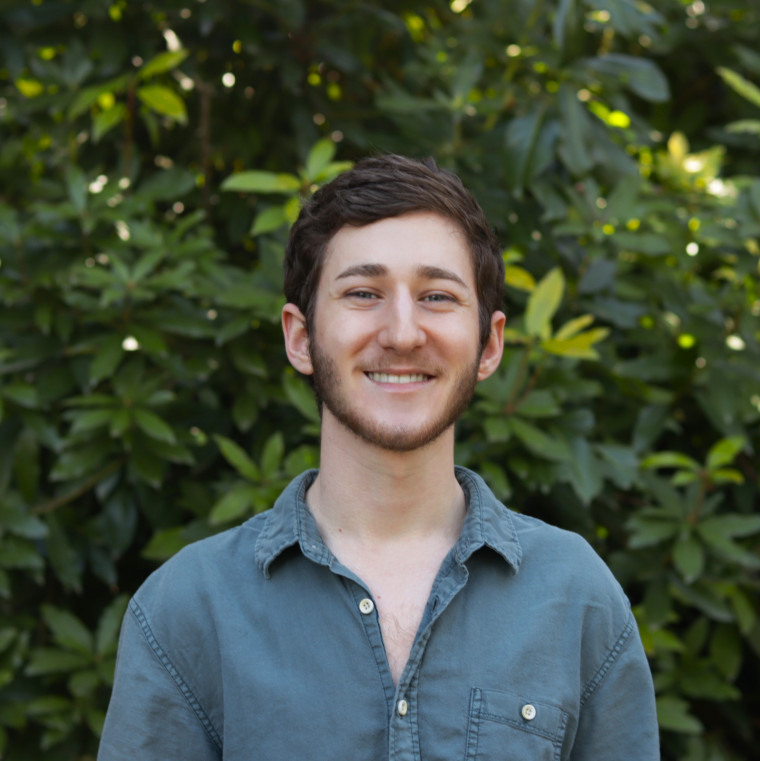Avi Strok
When I visited Lewis & Clark, I was greeted by a stunning campus that checked all my boxes—a supportive and collaborative environment in the Pacific Northwest with small class sizes.

Pronouns
Degree and Class Year
Hometown
Major
Extracurriculars
Overseas study
What three words would you use to describe L&C?
What’s your favorite class? Why?
My favorite class so far has been Calculus 2 with Associate Professor Paul Allen. Even though I didn’t come to L&C to study math specifically, Paul’s enthusiasm for math is infectious. He is an engaging lecturer, effortlessly funny, and makes the content accessible. I always looked forward to his class and absolutely recommend students take a course he teaches.
What made you want to come to Lewis & Clark?
I knew I wanted to go to a small college in a cooler climate with lots of trees and greenery, making sure to avoid a cutthroat and competitive academic environment. When I visited Lewis & Clark, I was greeted by a stunning campus that checked all my boxes—a supportive and collaborative environment in the Pacific Northwest with small class sizes. What really sealed the deal for me was the dedicated biochemistry and molecular biology major, since I knew I’d be able to focus on the part of biology that interested me the most and its intersections with chemistry.
What do you like or find most interesting about your major?
Coming into college I had a particular interest in genetics, and I love that the biochemistry and molecular biology program allows me to study exactly what I’m interested in! Given my interest in cell/molecular-scale biology, this major feels like a match made in heaven. I love that there are lots of lab courses in the major, allowing my education to be more than theoretical.
Tell us about your support systems and social outlets on campus: people, activities, clubs, res halls, etc.
Since coming to Lewis & Clark, I’ve begun cross-stitching and getting together with friends to do fiber arts together! Having a peaceful activity and safe social space on campus is reassuring to have. There is also a great community in the SEED (Students Engaged in Eco-Defense) Club, where I’m able to help with the bee garden and other sustainability-related projects with other students with similar interests.
If you went on a New Student Trip with College Outdoors, how did it shape your experience as an incoming student?
Making bonds with other incoming first years made the transition to an entirely new environment much less daunting. It was reassuring to see familiar faces around campus, and having people to eat meals with made the first few weeks feel much more manageable. I’m still great friends with a lot of the people I met on my New Student Trip!
If you have studied or will study overseas while at Lewis & Clark, how did you choose your program? What did your overseas study add to your L&C experience?
I am going to study abroad next semester in Berlin, where I’ll take structural biochemistry. My goal was to go on a departmental program for either biology or chemistry somewhere in Europe, so it worked out perfectly! I’m glad I’ll be making progress on my major courses while getting the opportunity to go overseas.
What advice do you have for incoming students?
Good things come to those who attend office hours! If you’re trying to figure out what you want to study or just want to make connections in your desired department, attending office hours is a great first step. Even if you don’t have a specific question to ask, still go and get to know your professors!
Have you had the opportunity to do research with a professor? If so, please describe the project and the experience.
I am currently researching under Associate Professor Norma Velazquez-Ulloa, studying the effects of nicotine exposure on behavior and development in Drosophila melanogaster, the common fruit fly. My current experiments are investigating how nicotine produces addictive behavior in flies with genetic differences, hopefully identifying genes that are important for how the brain responds to drugs. Learning how to plan experiments, run different behavioral assays, and use new tools for genome analysis has been an incredibly rewarding experience. The process of “doing science” feels much more real to me now, and since starting in the lab I can picture myself going into a career doing research.
More Admissions Stories
Admissions is located in Frank Manor House on the Undergraduate Campus.
MSC: 32
email admissions@lclark.edu
voice 503-768-7040
fax 503-768-7055
Vice President of Admissions and Financial Aid
Eric Staab
Admissions
Lewis & Clark
615 S. Palatine Hill Road MSC 32
Portland OR 97219

